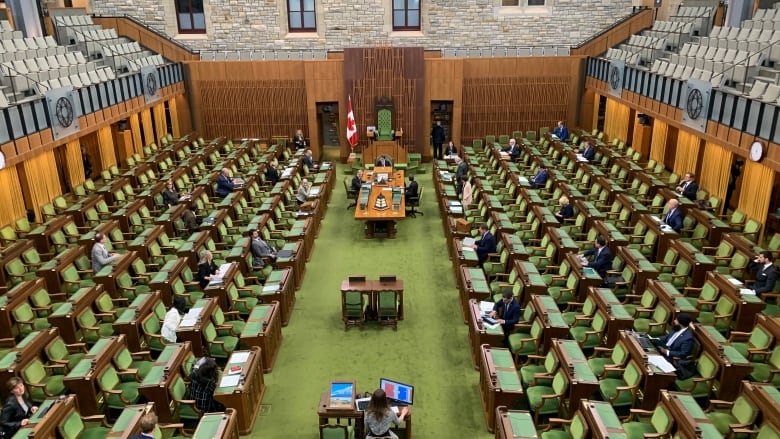Students who collect emergency COVID-19 aid must attest they're looking for work
Conservatives suggested the support could discourage people from seeking work while employers face labour gaps

Students who collect emergency financial aid will be required to confirm that they're looking for summer work and will be connected with a government job bank to help employers struggling with shortages of labour.
Legislation providing $9 billion in assistance to students who saw their summer employment prospects dry up due to the COVID-19 crisis — which was adopted at second readings and at all stages in the House of Commons tonight and sent to the Senate — says applicants must "attest to the fact that they are seeking work."
The bill also says that the government will make information available about employment opportunities through a government-managed job posting system.
A small group of MPs debated the bill in the House of Commons this evening.
Under the new program, students would be eligible for $1,250 a month from May through August.
The benefit is available also to students who have jobs but are making less than $1,000 a month.
Earlier today, the House adopted two motions with elements that appear to address some concerns voiced by opposition parties.
The government's initial plan was to provide a payment of $1,750 to students caring for dependents or those with a disability. One of today's motions provided an additional $250 monthly top-up, something the NDP had been pushing for.
That means students in that category will receive $2,000 a month — the same amount offered by the Canada emergency response benefit (CERB), which provides assistance to Canadians who lost their incomes due to the global pandemic.
Matching students with employers
The government is also taking steps to match students with employers who need to fill labour gaps.
Conservatives had warned that the aid package could create a disincentive for students to look for summer work at a time when some essential sectors, such as agriculture, agri-food and fish processing, are facing labour shortages.
Today's motion said there will be new financial incentives and support measures to connect Canadians, particularly students and youth, with various available jobs "to ensure regional economic stability and food production during this crisis."

The motion also says the government will deliver the assistance in a way that "meets their objective while encouraging employment in all circumstances."
Under the legislation, the program will undergo a "comprehensive" parliamentary review by Sept. 30, 2021 — something else the Conservatives had been seeking.
Prime Minister Justin Trudeau announced the suite of benefits last week in response to critics claiming that too many young people were being left out of other pandemic support programs.
The student aid bill was provided in advance to opposition parties on the weekend; negotiations on potential changes have taken place over the last several days.
Food shortage concerns
Earlier today, Conservative MP Jacques Gourde asked if the government would establish a system that would allow students to make up for the shortage of temporary foreign workers.
"Food shortages will increase if things are not changed," he said.
Employment Minister Carla Qualtrough said students are eager to work and serve their communities.
"We're looking at ways to ensure that we create and incentivize opportunities, particularly in essential areas like agriculture, for our students," she said.
Bloc Québécois Leader Yves-François Blanchet said students should have a basic income support, but there should also be built-in incentives to encourage them to work. The underlying principle for the program should be that the more students work, the more money they make, he said.
Blanchet said constructing a program that is too generous and lacks incentives to work would not help those sectors that need labour.
"Students will do the math," he said.
Blanchet also said students can't be coerced into work they don't want to do, and rejected the suggestion that students are not hard-working.
"There are three things that students are not. They are not kids running with flowers in their hair, naked in the field. Neither are they young lazy people smoking cannabis in the basement and they are not merchandise that you deliver to somebody that says they need it," he said.
NDP Leader Jagmeet Singh has been pushing for a universal support benefit that would help everyone who needs it. If someone gets money they don't need, that can be addressed at tax time, he said again today.
"We've got a year to figure that out. Right now is not the time to deny help to people. It's a time to make sure they get that help and get that help quickly," he said.
Before the top-up for students was confirmed this afternoon, Singh called it "unjust" that a student who is a mother would be eligible for less than someone who could get $2,000 a month through the CERB.
Job opportunities have vanished
Jared Maltais, a spokesperson for the Canadian Alliance of Student Associations (CASA), said students want to engage in the workforce as they do every summer, and that 41 per cent of students rely on summer income to support their studies.
He said the effects of the COVID-19 crisis have seen many of their usual job opportunities dry up.
Asked about the proposal to tie aid to jobs in fields like agriculture, Maltais said CASA believes the Canada emergency student benefit should be available to all students.
"Students want to work and, if able, will work if they have the opportunity in a safe and accessible workplace," he said.
The government is also offering a special grant program that will give students who volunteer over the summer a stipend of $1,000 to $5,000, depending on the hours they work.
The House of Commons is formally adjourned until May 25, but a special committee, which includes all 338 MPs, is holding virtual and in-person meetings during the pandemic.
Today's in-person meetings involved a scaled-down number of MPs in order to follow physical distancing guidelines.


